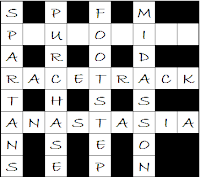 |
| Puzzle Theory Part One |
Exactly what is a puzzle, and what isn't. In our first look at puzzle theory we tackle a question whose goalposts move on a daily basis. Just how do we define the word puzzle.
Most people recognise a puzzle when they see one, but defining exactly what it is that makes something a puzzle, rather than a question, is somewhat more difficult. Wikionary suggests that a puzzle is anything that is difficult to understand, but quantum physics is difficult to understand and that isn't what most people would call a puzzle.
Perhaps we could start with some things that are definitely not puzzles and work from there.
Quizzes
Quizzes are of course a test of our knowledge, sometimes general, other times more specific; whichever is the case quizzes give a question to which there is one complete and easily obtainable answer, the challenge lies in knowing what the answer is. If you do not know the answer based on the question and conditions given, there is little chance of working it out.
 |
| An example of a nearly complete crossword. |
Take for example the one remaining clue in this grid.
Transuranic radioactive chemical element with the atomic number 94.
Now if you can work out that clue without looking at the grid, all kudos to your chemistry teacher. But with the grid, the only part of the clue that matters is the phrase 'Chemical Element', and the letters already worked out. Only one element fits the letters given so that must be the answer.
Maths
Just because it has mathematics involved, does not mean that a question becomes a puzzle. I have a great love of mathematics but I am constantly frustrated by puzzle books which pass off mathematical problems as puzzles. It seems a bit mean when I've just welcomed crosswords to the puzzle arena with open arms so let me give you an example.
7. Saving Up
It's a brilliant exercise in explaining exponential growth, geometric sequences and of course, in checking the small print. Since it's not a puzzle I don't expect you to go off and do the mathematics it involves a lot of addition and multiplication that really requires a calculator unless you have a day spare.A young family were at the end of their tether as to what to do with their 10-year-old son. Something of a mathematical prodigy the boy was constantly frustrated at school, and therefore caused trouble. The parents decided it would be a good idea to start giving the child pocket money so he had something to focus on. The child agreed and asked if they could try it for a month, he would start by getting a penny for the first day, they 2p for the second, 4p for the third and so on getting twice as many pennies each day. The parents, not so good at mental arithmetic agreed. How much had the child saved after 30 days?

Your eyes do not deceive you by the way, the answer is over ten million pounds. The thing is, the way to find the solution to this question was given entirely in the original problem. This makes it, in my view, not a puzzle; bringing us to a second definition of a puzzle. A puzzle requires you to find the correct method.
Spatial Reasoning
Everything from Spot the Difference to visual IQ tests belongs in this category, and it's a complicated one, because there are plenty of puzzles that do involve spatial reasoning. What we're ruling out here are two distinct types of visual problem. The first type are visual recognition problems, which include spot the difference, find the object, match the shape and so on. Naturally these are ruled out because the method is implicitly stated in the question.
The second kind are of they type often found in IQ tests and involve taking an image, and performing a transformation on the image in your head, then identifying which of a series of further images is formed. Many people have a great deal of difficulty with this kind of test so it's no surprise that they get lumped in with puzzles. Again the method implicitly stated at the outset, however complicated the transformation, it's just not a puzzle.
So what is a puzzle?
A puzzle is a question which has a logically derived answer. That answer may not be commonly known, but it can be arrived at by working through a logical method. There may be many methods of solution, but none are specified in the puzzle.
Hopefully that clears up the kind of things we'll be looking at in this blog; although I can't promise O wont break these rules now and again to show you something interesting! So for now and until the next time, keep puzzling.

No comments:
Post a Comment